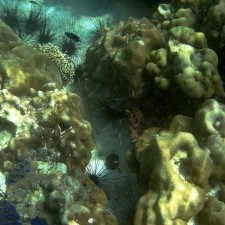Ocean Acidification
Acids and Bases
The immense amounts of CO2 being pumped into the atmosphere affect the planet by acting as a greenhouse gas. Just as important, they dissolve into the oceans, reacting with seawater to form carbonic acid. This reduces the concentration of carbonate, a base, in seawater.
The ocean is full of organisms known as calcifiers – creatures large and small – that use carbonate and calcium ions dissolved in seawater to construct their shells and skeletons. These organisms may be under increasing threat as the oceans acidify because it becomes so much more difficult for them to build and maintain their shells.
Calcifiers under Threat
Most famous among marine calcifiers are the corals, which build reefs of calcium carbonate that are some of the greatest hotspots of biodiversity in the ocean. Other calcifiers include marine snails (pteropods); shellfish (clams, etc.); crustaceans like shrimp and lobsters; and starfish, sea urchins, and their kin (echinoderms).
Even single-celled amoeba called foraminifera and photosynthetic algae called coccolithophores encase themselves in calcium carbonate platelets. Many of these organisms serve fundamental roles in marine ecosystems, either as food for larger organisms or in the biochemical processes that shape oceanic environments and climate.
A Long-Term Problem
Part of what makes acidification such a pressing concern is how fast the problem developed. Ocean acidification has become a threat just in the two hundred years or so since the advent of the Industrial Revolution, and there is strong evidence it is a direct result of human activity.
The damage we’ve done in those two hundred short years may take the planet’s natural mechanisms tens of thousands of years to counteract. (Think of the erosion of basic compounds from the land into the sea, for example.)
Researchers at MIT and Woods Hole are at the forefront of trying to understand the effects of ocean acidification on life in the ocean. We are studying how corals respond to acidification, taking into consideration the entire reef, its community of polyps, and microbial communities that coexist within each coral.
Key Questions We’re Exploring
- What is the impact of ocean acidification on life and specifically corals?
- What might happen to ocean chemistry if CO2 emissions continue as now?
- What is the role of microbes in coral ecosystems?







